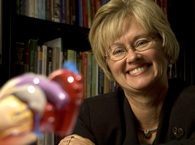News Release: Research, School of Nursing
Oct. 21, 2009
Costs and Quality of Life Among Heart Failure Patients with Diabetes Studied
 Sandra Dunbar, RN, DSN, FAAN, FAHA
Sandra Dunbar, RN, DSN, FAAN, FAHAEmory University cardiovascular nursing researcher Sandra Dunbar, RN, DSN, FAAN, FAHA, has received a three-year, $1.3 million grant from the National Institute of Nursing Research of the National Institutes of Health to examine quality of life among heart failure patients with diabetes.
People with heart failure (HF) are often asked to perform several self-care activities, including maintaining a low-sodium diet, adhering to complex medication regimens, monitoring their weight and symptoms, boosting their physical activity and communicating changes in their conditions to their health care providers. These tasks can prove overwhelming for HF patients who have other chronic conditions like diabetes.
Dunbar's project, "Cost effectiveness and quality of life in heart failure patients with diabetes," will test the impact of an integrated self-care intervention on heart failure and diabetes patients' self-care behaviors. The self-care intervention involves traditional counseling provided before hospital discharge in addition to a follow-up visit by a nurse to the patients' homes.
"We hope that the integrated intervention will make self-care easier and more understandable for patients with heart failure and diabetes," says Dunbar, Charles Howard Candler professor of nursing at Emory's Nell Hodgson Woodruff School of Nursing. "By making it easier and more understandable, patients will do a better job of managing both their illnesses, and hopefully avoid being readmitted to the hospital."
The study will also assess the effect of the integrated intervention model on patients' re-hospitalization admission rates, which are significantly higher among this patient population, and their overall feelings of wellbeing.
Steven Culler, PhD, a health economist at Emory's Rollins School of Public Health, says, "Reducing the number of re-hospitalizations will be the key to making the integrated self-care intervention cost effective because we anticipate that the intervention will be more costly to provide than traditional counseling during the initial hospitalization." Culler will be estimating the cost of health care resources consumed during the study.
"If the intervention results in a large enough reduction in re-hospitalizations, it could actually reduce total health care costs and improve patient wellbeing," says Culler.
It is estimated that 30 percent to 50 percent of heart failure patients are also diabetic. Having both chronic illnesses increases a patients' risk of re-hospitalization 1.6 fold when compared to patients with just heart failure. There is also a 40 percent to 80 percent increased risk of death for heart failure and diabetes patients over those with heart failure alone.
Study team member Javed Butler, MD, associate professor of cardiology in the Emory School of Medicine, says, "This is a major clinical problem. Heart failure worsens diabetes, and diabetes worsens heart failure. These patients are increasing in numbers and have worse outcomes than those with either of the two diseases alone. In this respect, this research is of paramount importance."
In addition to this project, Dunbar and team have received a two-year, $425,000 grant from the National Institutes of Nursing Research as part of the American Recovery and Reinvestment Act for "Improving self management and outcomes in heart failure patients with diabetes."
The stimulus grant supported project will use qualitative methods to identify patients' perspectives on what it is like to live with both heart failure and diabetes. Information gathered from the study will aid in the design and testing of a nurse-managed intervention to improve outcomes in heart failure patients with diabetes.
###
The Robert W. Woodruff Health Sciences Center of Emory University is an academic health science and service center focused on missions of teaching, research, health care and public service. Its components include schools of medicine, nursing, and public health; Yerkes National Primate Research Center; the Emory Winship Cancer Institute; and Emory Healthcare, the largest, most comprehensive health system in Georgia. The Woodruff Health Sciences Center has a $2.3 billion budget, 17,000 employees, 2,300 full-time and 1,900 affiliated faculty, 4,300 students and trainees, and a $4.9 billion economic impact on metro Atlanta.
Learn more about Emory’s health sciences:
Blog: http://emoryhealthblog.com
Twitter: @emoryhealthsci
Web: http://emoryhealthsciences.org
